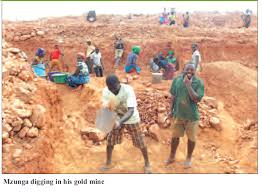The Malawi Women in Mining (MAWIMA) has expressed concern over exorbitant fees charged by the Malawi Revenue Authority (MRA) and other government departments in the process of seeking authorization to export their products.
MAWIMA raised the issue at this year’s 2019 Annual Exporters Seminar in Lilongwe organized by Malawi Investment and Trade Centre (MITC) to appreciate the challenges that exporters in the country are facing and suggest mitigation measures.
Chairperson for MAWIMA North Margaret Nkhoma said the exorbitant fees and taxes charged in acquiring licenses and processing export permits for gemstones is restricting women with capital constraints from joining the trade.
“When we want to export the stones, we initially consult Geological Survey Department to inspect the stones and give us inspection certificate. Then we take the product to Mines Department to give us an export permit. After that to Malawi Chambers of Commerce and Industry to acquire forms which outline all export procedures,”

“From there we go to CDH bank to help us in making sure that the foreign currency is deposited into our bank accounts, and finally to Reserve Bank of Malawi where they do cross check bank deposit slips. In all these steps, we need to pay some fees, which is an obstacle to us,” Nkhoma said.
Nkhoma said such a cumbersome process is a stumbling block to them on the issue of penetrating the export market.
She, therefore, urged the government to review the process of acquiring licences and processing export permits for gemstones to make it easy for the miners to export their commodities.
Nkhoma also pleaded with the government to provide civic education to women miners on value addition so that they are able to export processed gemstones, which would boost export earnings.
“It is high time the government recognized us as one of the key players in the economy and gave us incentives as they do with big companies. In so doing, we can immensely contribute to the country’s economy by raking in more foreign exchange,” she said.
Nkhoma also lamented government’s ban on the use of heavy machinery like excavators by artisanal and small-scale miners which, she said, has negatively impacted on the time taken to execute a mining operation.
Principal Secretary in the Ministry of Tourism, Industry and Trade, Ken Ndala, admitted that there is a need to streamline export processes to do away with trade imbalances hinting that his Ministry is working with Malawi Bureau of Standard (MBS) to map out ways to speed up the process while not compromising on quality and standards.
“It is also our duty to sensitize exporters on the steps to follow to export products,” he said.
Ndala encouraged the exporters to produce high quality products saying production of low quality products is another contributor to the country’s low export earnings.
MITC CEO Clement Kumbemba lauded the gathering saying it provided a platform where the exporters were able to learn from one another and interact with possible local and international buyers.
“This exporters’ seminar has helped us to identify short falls of the cooperatives, find possible mitigations and also link them with service providers in the country,” he said.

The Malawi National Export Strategy report of 2013-2018 indicates that exports in the country have grown at a much slower pace than imports over the past ten years, creating an unsustainable structural trade deficit that leaves Malawi vulnerable to aid and foreign exchange shocks.
This challenge has been driven by an unrepresentative exchange rate and insufficient expenditure of aid and debt relief monetary flows on the development of the productive economy, of which exports are a subset.
The strategy appeals for economic reforms to address structural weaknesses to put in place the export chart.
Key recommendations in the strategy include: promoting the diversification of export clusters in order to increase macroeconomic stability, generating sufficient foreign exchange through increasing investment; supporting the development of institutions essential in facilitating investment, the development of the productive base of the economy, and hence trade, within Malawi;
Increasing incentives to invest and improving Malawi’s underlying economic enabling environment –improving access to energy, finance, transport services; and Investing in human capital, while linking this development to the knowledge and skills being demanded by private industry.

